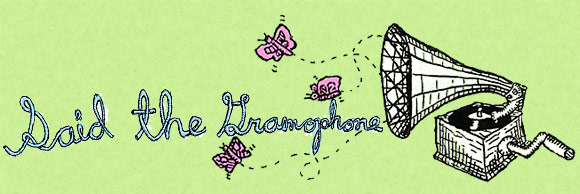Robyn Hitchcock - "My Favourite Buildings"
The scary thing about Robyn Hitchcock's special breed of insanity is that it very nearly passes for lucidity - he buries his absurdities in verses of seemingly meaningful, but ultimately ridiculous, lyrics. Hitchcock is deceptive too because he presents his words in a trust-inspiring naive pop, like a British Jonathan Richman. At first his song seems to be an analogue of Joni Mitchell's "Big Yellow Taxi," where, unlike in the latter song, paradise isn't nature, but Hitchcock's preferred architecture. Hitchcock sings, "My favourite buildings are all falling down/feels like I dwell in a different town," and maybe the listener gets a bit choked up, moved by the thought of the collateral damage of human progress. Then, with the same sad conviction, Hitchcock intones, "But why should I bother with painting them brown/when they'll all be pulled down in the end?" Uh, who said anything about painting them brown?! Still, what a nice song, so the listener gives him the benefit of the doubt, and immediately regrets that decision upon hearing the following similes: "My favourite buildings stretch upward for miles/remind me somehow of your favourite smiles/like oak leaves in autumn/cascading on stiles/in the rain." Poetic license be damned: Common sense has been contravened! The last verse confirms that the song is literally nonsensical and, if metaphorical, only incomprehensibly so. The listener is left nodding her head to this melancholy pop song, wondering how she could have been so affected by the product of a mind not bound to our particular modes of understanding. [Buy]
***
Erin Costelo - "The Trouble and the Truth (Part 1)"
Erin Costelo - "The Trouble and the Truth (Part 2)"
Perhaps this speaks more to the unusual musical proclivities of my adolescence than it does to the quality of Erin Costelo's baritone voice, but when Costelo sings, she reminds me most of all of Genesis-era Peter Gabriel. Costelo doesn't sound like Gabriel exactly, and more often than not, her jazz-inflected, sprawling pop songs owe a greater debt to the composer of "Big Yellow Taxi" than to the man behind "Carpet Crawlers." It's in the way Costelo acts the parts of her songs' protagonists that she recalls Gabriel and his ability to inhabit his many characters and convincingly sing in their voices. In the two versions of "The Trouble and the Truth," the careful ballad that begins and ends Costelo's new EP of the same name, the singer and pianist shows us how a melody's meaning depends upon its frame. The first part - rumbling organ, lonely and reflective - sounds like a distant but formative memory; while the second part, in which Costelo sings more vigorously, accompanied by church-reverb piano and an affectingly unsteady male voice, seems vital and immediate. Only because of the Gabriel-like evocativeness of Costelo's arrangements and delivery can we hear that she begins her album at its end and ends it at its beginning. [Info]
Posted by Jordan at October 17, 2007 5:38 PM



